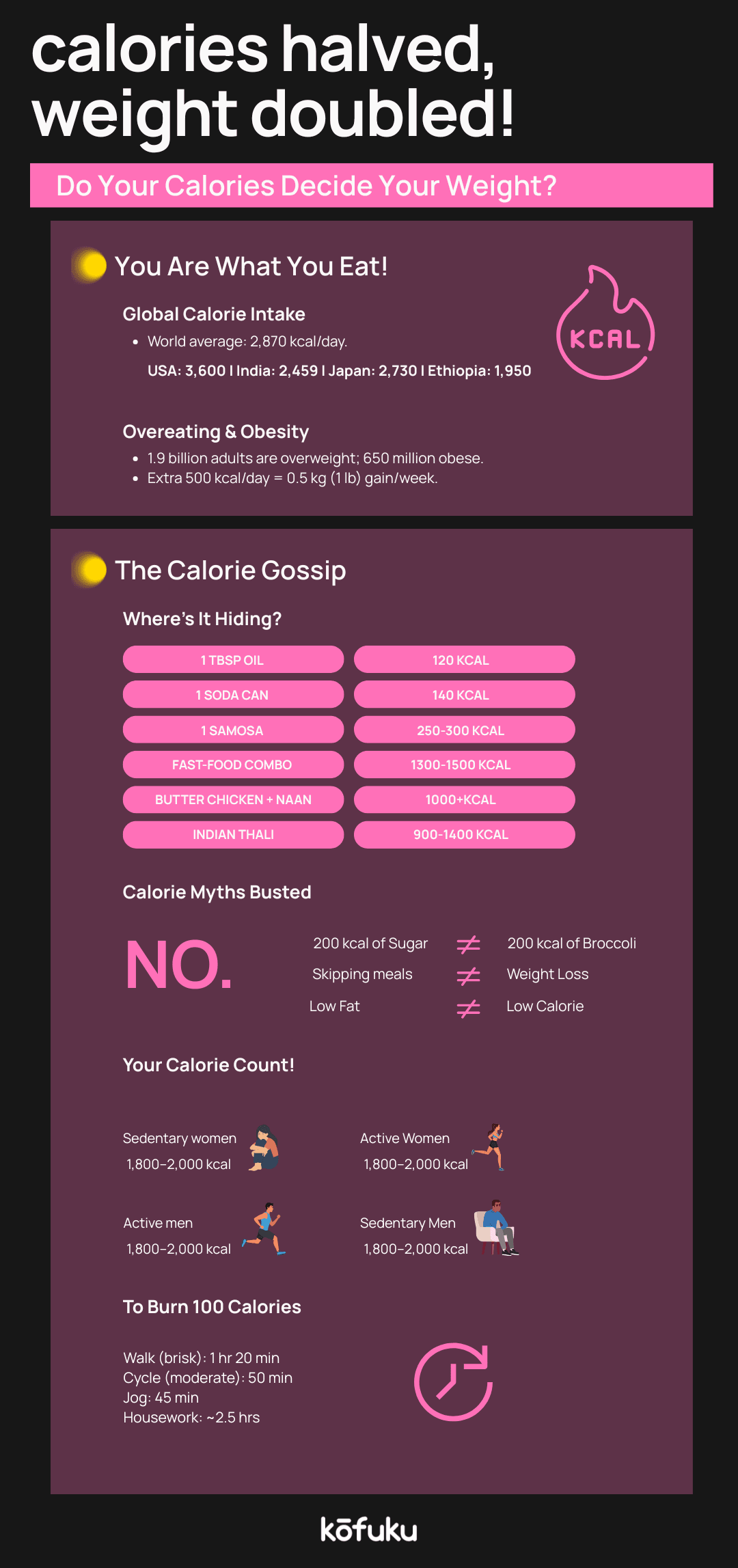Why You're Not Losing Weight Despite Calorie Deficit or Intermittent Fasting


Introduction
You have skipped deserts and said no to a second serving and maybe even swapped ghee-laden parathas for oats. Yet the stubborn scale refuses to budge, right?
In India, in a culture where food is an integral part of celebrations, family bonding, and daily routine, we can understand that the struggle to lose weight can feel exhausting, especially when you are doing everything ‘right’.
The principle of weight loss is simple in theory: Burn more calories than you consume, and you may lose weight. This concept is called calorie deficit and is considered the foundation of fat loss.
So why are so many people in India not losing weight despite following a calorie deficit? This blog explores the complex reality behind this pressing question. From hidden calorie traps in Indian diets to metabolism and hormonal obstacles, we will take you beyond the maths of calories in versus calories out.
Whether you are not losing weight despite exercise, following intermittent fasting, or eating ‘healthy’, here's what might be really going on and how to break it.
Can you not lose weight in a calorie deficit?
Physiologically, if you maintain a genuine calorie deficit over time, weight loss is bound to happen. However, the issue lies in the accuracy of that deficit. You may think you are eating less than you burn, but the body doesn't always follow our assumptions.
Hidden Calories in Indian Diets
1. Cooking Oil and Ghee:
Did you know that a single teaspoon of oil contains over 120 calories? Indian veggies and curries contain a generous amount of oil and ghee, making it easy to underestimate intake.
2. Chutneys and Pickles:
Chutneys and pickles are common in all Indian households and may seem to be innocent add-ons to the plate. But, they are often high in sugar, oil, and salt.
3. ‘Healthy’ Snacks:
What may seem healthy might not always turn out to be healthy. Homemade snacks such as roasted chivda, protein bars, or even homemade granola may be nutrient-dense, but they are not always low in calories.
4. Liquid Calories:
Not only snacks, but even beverages you drink might not be healthy. Masala chai made with sugar, fruit juices, flavoured milk, or lassi can significantly add calories without making you feel full.
Portion Sizes
Indians are very insistent and persistent when it comes to food. It's a way of showing our love and care, right? You might have fallen prey to sentences like ‘just half a chapati more’ or ‘just a small portion of rice’.
Indian home-cooked meals often come without precise measurements. A small extra serving of rice or two extra rotis can easily tip your intake beyond the deficit.
Inaccurate Tracking and Overestimating Burn
Most people overestimate how many calories they burn through workouts, especially with fitness trackers that aren't always precise. If you are not losing weight but working out, it might be due to this mismatch between effort and output.
Beyond Calories: The Physiological Roadblocks
Even if your calorie tracking is accurate, several medical reasons for not losing weight may derail your progress.
Hormonal Imbalances
-
Thyroid Issues (Hypothyroidism): Hypothyroidism is common among Indian adults, and an underactive thyroid gland affects your metabolism, leading to fatigue and weight gain despite calorie control.
-
PCOS (Polycystic Ovary Syndrome): A leading cause of trouble with losing weight in Indian women is PCOS. It causes insulin resistance, increasing fat storage and making fat loss even harder.
-
Insulin Resistance: A long-term, high-carbohydrate, sugar-heavy diet can desensitise your cells to insulin, encouraging fat retention even in a calorie deficit.
Medication Side Effects
Some drugs, including those for diabetes, depression, and hormonal therapy, can make losing weight more difficult. Always consult your doctor if you suspect your medications may be involved.

Metabolic Adaptation (Plateauing)
As you lose weight, your basal metabolic rate (BMR) decreases because a smaller body burns fewer calories. This adaptation can halt progress, even in a continued calorie deficit.
Water Retention
Unfortunately, the scale doesn't differentiate between fat, water, and muscle mass. Salt intake, hormonal shifts, and inflammation from workouts can cause temporary fluid retention, which might explain not losing weight even after exercise.
Gaining Muscle, Losing Fat
If you are lifting weights or doing strength training, you might not be losing weight, but working out. You may be building muscle and losing fat simultaneously, which doesn't reflect on the scale but improves body composition. Pay attention to how your clothes fit and use measurements instead.
Lifestyle Factors Sabotaging Your Efforts
Chronic Stress
A majority of the Indian population is under stress. Whether it be stress from work, family, or societal expectations. Stress triggers cortisol, a hormone that promotes fat storage, especially around the midsection. It also increases cravings for high-calorie comfort food, fuelling cycles of emotional eating.
Poor Sleep
Lack of sleep disrupts leptin and ghrelin, hormones regulating hunger and fullness. It also raises cortisol, the stress hormone, affecting insulin sensitivity and fat storage.
Mindless Eating
Eating while watching TV or scrolling through social media on your phone leads to overeating. In many Indian households, communal eating or snacking while cooking is routine and often untracked.
Inconsistency
Following your routine diligently for five days and letting go over the weekend can undo all the efforts you have put in during the week. Long-term results demand consistent habits.
Social and Cultural Habits
From wedding feasts to festival mithai, our food culture thrives on abundance, and saying ‘no’ often means disrespect or antisocial behaviour. Navigating through these social minefields is critical for sustainable weight management.
Not Losing Weight on Intermittent Fasting
Intermittent Fasting (IF) only works if you maintain a calorie deficit. Many people mistakenly overeat during eating windows or consume calorie-dense fast-breaking meals like parathas, fried snacks, resulting in not losing weight even with intermittent fasting.
Not Losing Weight on Keto
The keto diet helps restrict carbs and initially drops water weight. However, not losing weight on keto occurs when high-fat foods are consumed in excess, negating the calorie deficit. Peanut butter, cheese, and nuts can quickly rack up calories.
Realistic Expectations and What to Do
How Much Weight Loss is Normal in a Month?
A safe and sustainable rate is 0.5-1 kg per week, or 2-4 kg per month. Anything faster than this rate may be water loss or muscle breakdown.
Steps to Get Back on Track
-
Re-evaluate your intake: Use apps like MyFitnessPal or HealthifyMe to track your food for at least three to five days.
-
Increase Protein and Fibre: These help keep you full and boost metabolism. Indian diets are often carb-loaded; add daals, tofu, paneer, and vegetables.
-
Choose Whole Foods: Swap refined carbs and processed snacks for unprocessed, home-cooked options.

Is Weight Loss Possible Without Strict Dieting?
Without diet, weight loss is possible, but there is a catch! You don't need a rigid diet, but you do need a sustainable shift in eating behaviour. Small changes like mindful eating, portion control, and fewer liquid calories can make a big difference. If you are not losing weight even after exercise, food intake must still be addressed.
Weight loss is very rarely linear or easy, and not losing weight despite a calorie deficit doesn't mean you are failing; it means your body is adapting or something else needs attention.
Reassess, track honestly, and stay consistent. If progress stalls or you are concerned about not losing weight due to medical reasons, speak with a qualified nutritionist or a doctor.
Your journey is valid. Be patient, stay informed, and most importantly, don't give up!

FAQs
Q. Is it possible to eat in a calorie deficit and not lose weight?
A. You will lose weight if you’re in a consistent calorie deficit; however, there can be times when we believe we're in a calorie deficit, but we're not. This happens due to inaccurate tracking, hidden calories, and physiological or lifestyle issues.
Q. Why am I not losing weight in a calorie deficit?
A. You may still be underestimating your calorie intake from hidden sources, overestimating your calorie expenditure, or facing physiological issues such as hormonal imbalances, metabolic adaptation, or high levels of stress.
Q. Why am I not losing weight on 1500 calories a day?
A. Everybody is different. 1500 calories for one person might be very little, while for another, it might be just perfect. A lot of the time, when eating 1500 calories, we may be going over the limit with hidden oils, unhealthy "healthy" snacks, liquid calories, or inaccurate portioning in Indian meals. Hormonal issues or poor sleep also play a role in the weight loss process.
Q. Why is my weight stuck even after a calorie deficit?
A. Your weight could be stuck for a number of reasons, including metabolic adaptation, water retention, or gaining muscle mass while losing fat mass. Chronic stress levels, poor sleep, and inconsistency can also contribute to the plateau, along with your dietary practices.

Comprehensive Guide to Superfood Nutrition for Better Health

Healthy Family Nutrition Tips for Strength and Togetherness

Potassium-Rich Diet Tips to Boost Your Nutrient Levels

10 Weirdest Myths About Weight Training

Elderberry Juice for Weight Loss: Fact or Fiction?

Exploring Weight Loss Drugs and Their Effects

What Is RDA in Nutrition? Daily Nutritional Requirements for Indian Adults Explained

